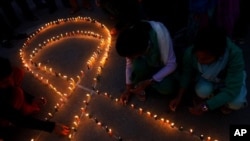On December 1st, we observe World AIDS day. First observed in 1988, World AIDS Day began as a way to increase awareness of the disease and support those affected by it, their families, their communities, even entire countries. It provided an opportunity to fight prejudice against people living with HIV, improve knowledge about the disease among the wider population, and raise money for research.
World AIDS Day was first conceived at the World Health Organization, or WHO, a specialized agency of the United Nations. This year's theme, which runs until 2015, is "Getting to Zero:" Zero New HIV Infections. Zero Discrimination and Zero AIDS Related Deaths. Other countries at the forefront of the fight against HIV/AIDS, including the United States, have come up with additional themes, reflecting their own efforts to eliminate the disease.
The Centers for Disease Control, a branch of the United States Department of Health and Human Services, first identified the Acquired immune deficiency syndrome, or AIDS, and its cause, the Human Immunodeficiency Virus, or HIV, in 1981.
The early years were tragic. The infection spread widely around the world, but the medical community had few weapons in its arsenal. In 1988, the life expectancy of most patients with AIDS was about two years.
We've come a long way since then. Today, for those who have access to medical treatment, a diagnosis of HIV/AIDS is no longer an automatic death sentence. Over 6 million people in the developing world are now receiving lifesaving antiretroviral treatment. In Africa, the world’s hardest-hit region, over 3 million people are receiving treatment with support from the U.S. President's Emergency Program for AIDS Relief, or PEPFAR. And the number of new infections each year around the world has dropped by approximately 25 percent over the past decade.
These are encouraging signs, and new scientific advances hold great promise. This year's U.S. Government theme, "Leading with Science, Uniting for Action," highlights the opportunity to do more. Ultimately, the shared responsibility to fight this disease is one in which all have roles to play. This World AIDS Day is a time for all of us to commit to the goal of an AIDS-free generation.
World AIDS Day 2011

World AIDS Day began as a way to increase awareness of the disease and support those affected by it.



